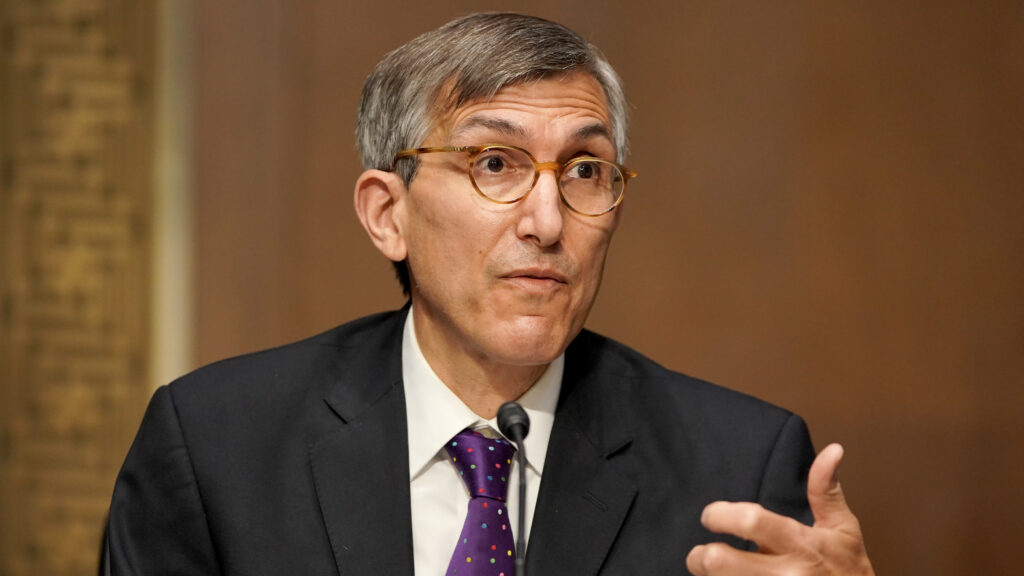LONDON — The incoming Trump administration and its embrace of anti-vaccine figures will give scientists and public health officials the chance to make the case for the value of immunizations, the top vaccine regulator in the U.S. said Thursday as he made a forceful defense of life-saving vaccines.
But if the public health side fails, the U.S. could face dire consequences, the Food and Drug Administration’s Peter Marks warned.
advertisement
“If that doesn’t work, and everything runs wild in the opposite direction, just as your kids learn natural consequences — if you put your hand on a hot oven, you will get burned, et cetera, that kind of thing — the American public will learn the natural consequences of what happens if vaccination rates fall too far, because we will start to see measles, polio, things that we should never see in a well-developed country, come back,” said Marks, who was speaking virtually at the Jefferies London Healthcare Conference.
Marks, who leads the FDA’s Center for Biologics Evaluation and Research, noted that scientists will need to make clear that they have the facts on their side. No, the measles, mumps, and rubella vaccine does not cause autism. But when measles vaccination drops, more kids die from measles.
“I have to believe that some degree of moderation will prevail,” Marks said in a conversation with two Jefferies analysts. “I don’t doubt that we are going to have a very vigorous dialogue about the benefits and risks of vaccines. I think there will probably be a very vigorous dialogue around Covid-19 vaccines, possibly over pediatric vaccines.”
advertisement
But speaking as if he was trying to will his vision of the future into reality, Marks said: “My hope is that through an open dialogue, we will get to the right place.”
Marks has been making the case for the safety and efficacy of approved vaccines since the election. But his remarks at the Jefferies conference came after President-elect Trump last week selected vaccine critic Robert F. Kennedy Jr. to lead the Health and Human Services Department, with control over the FDA. RFK Jr. has fanned the flames of anti-vaccine rhetoric by alleging, falsely, that immunizations can cause autism, though he has said since the election that he does not intend to take any available vaccines away from people.
Marks did not mention Kennedy specifically in his answers to the analysts’ questions about the impact of the Trump administration and its officials on the FDA. Marks also noted that an announcement of Trump’s pick for FDA commissioner is expected imminently.
RFK Jr. has accused the FDA of waging a “war on public health” and claimed that the agency has been corrupted by drug companies, as well as the food and chemical industries. The selection of RFK Jr. to run HHS has led to fears that he could try to fire many of the agency’s experts, or that the second Trump administration will lead to more people leaving the agency on their own and dissuade people from joining the FDA.
Marks reiterated that he wants to keep his job.
“I will stay around as long as I’m considered to be welcome to stay around,” he said with a chuckle.
RFK Jr. grew in prominence during the pandemic as many Americans became disillusioned with government health agencies and felt doubts about the efficacy and safety of Covid-19 vaccines. Public health officials fear that any lingering questions about Covid shots could lead to more hesitancy around other vaccines.
Marks said that health agencies could have performed better during the pandemic, which could have bolstered confidence in Covid vaccines. For example, he said that when health officials described Covid shots as safe, that still meant there could be serious side effects in rare cases. But some in the public felt betrayed by that.
advertisement
“It’s a fact that there is a lot of vaccine skepticism in the United States,” Marks said. “Some of it may be warranted — we did not do the perfect job of communicating things during the Covid-19 pandemic.”
But, Marks added: “Much of it is unwarranted, and is the result of conspiracy theories, misinformation, and people calling information misinformation. It’s a really big mess.” He said scientists and health officials need to leverage the facts behind vaccines to confront that skepticism.
Later in the conversation, Marks came back to the term “misinformation.”
“I hate using the word ‘misinformation,’ because it’s become a wastebasket term for lies,” he said.

